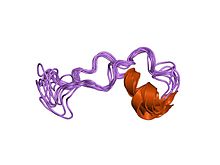This article is missing information about Microcin B17 and sagBCD family. (December 2020) |
Microcins are very small bacteriocins, composed of relatively few amino acids. For this reason, they are distinct from their larger protein cousins. The classic example is microcin V, of Escherichia coli. Subtilosin A is another bacteriocin from Bacillus subtilis. The peptide has a cyclized backbone and forms three cross-links between the sulphurs of Cys13, Cys7 and Cys4 and the alpha-positions of Phe22, Thr28 and Phe31.[1]
| Subtilosin_A | |||||||||
|---|---|---|---|---|---|---|---|---|---|
 structure of Subtilosin A | |||||||||
| Identifiers | |||||||||
| Symbol | Subtilosin_A | ||||||||
| Pfam | PF11420 | ||||||||
| InterPro | IPR021539 | ||||||||
| TCDB | 1.C.84 | ||||||||
| OPM superfamily | 379 | ||||||||
| OPM protein | 1pxq | ||||||||
| |||||||||
Microcins produced by commensal E. coli strains target and eliminate enteric pathogens such as Salmonella enterica by mimicking the siderophores the pathogens use for iron scavenging.[2] Microcins also help commensal strains of E. coli outcompete pathogenic strains.[3]
BACTIBASE[4][5] database is an open-access database for bacteriocins including microcins.
References
edit- ^ Kawulka KE, Sprules T, Diaper CM, Whittal RM, McKay RT, Mercier P, Zuber P, Vederas JC (March 2004). "Structure of subtilosin A, a cyclic antimicrobial peptide from Bacillus subtilis with unusual sulfur to alpha-carbon cross-links: formation and reduction of alpha-thio-alpha-amino acid derivatives". Biochemistry. 43 (12): 3385–95. doi:10.1021/bi0359527. PMID 15035610.
- ^ Huang, Kai; Zeng, Jianwei; Liu, Xueli; Jiang, Tianyu; Wang, Jiawei (2021). "Structure of the mannose phosphotransferase system (Man-PTS) complexed with microcin E492, a pore-forming bacteriocin". Cell Discovery. 7 (1): 20. doi:10.1038/s41421-021-00253-6. PMC 8021565. PMID 33820910.
- ^ Sassone-Corsi M, Nuccio SP, Liu H, Hernandez D, Vu CT, Takahashi AA; et al. (2016). "Microcins mediate competition among Enterobacteriaceae in the inflamed gut". Nature. 540 (7632): 280–283. Bibcode:2016Natur.540..280S. doi:10.1038/nature20557. PMC 5145735. PMID 27798599.
{{cite journal}}: CS1 maint: multiple names: authors list (link) - ^ Hammami R, Zouhir A, Ben Hamida J, Fliss I (2007). "BACTIBASE: a new web-accessible database for bacteriocin characterization". BMC Microbiology. 7: 89. doi:10.1186/1471-2180-7-89. PMC 2211298. PMID 17941971.
- ^ Hammami R, Zouhir A, Le Lay C, Ben Hamida J, Fliss I (2010). "BACTIBASE second release: a database and tool platform for bacteriocin characterization". BMC Microbiology. 10: 22. doi:10.1186/1471-2180-10-22. PMC 2824694. PMID 20105292.